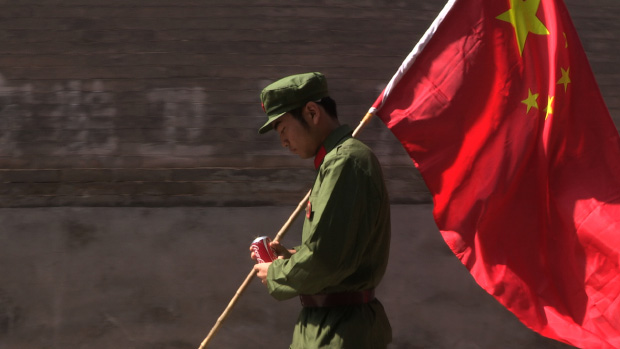Documentary filmmaker Du Haibin talks Chinese patriotism in ‘A Young Patriot’
FASCINATED by what it means to be a young Chinese person with a strong sense of patriotism, director Du Haibin filmed one patriotic student who slowly begins to question his beliefs in his country. Echo Chen caught up with the Chinese filmmaker before A Young Patriot‘s screening at the Melbourne International Film Festival.
In 2009, China was in the midst of celebrating the 60th anniversary of its founding. During these nation-wide festivities, filmmaker Du Haibin met a group of young people who were celebrating with a patriotic parade in Pingyao, an ancient city in northern China. The overwhelmingly passionate, flag-waving scene led to his initial idea of filming a documentary about the patriotism among Chinese youth.
“I know the parade itself is only the surface of the phenomenon, and there must be a complex of thoughts and reasons underneath. Why these young people are so patriotic, and what they do and think beyond the parade in their daily life — those are what fascinate me,” he said.
Thus his new documentary A Young Patriot was born, which screens at this year’s Melbourne International Film Festival.
“I saw they lacked a deeper thought about their relationship with the country, which they should have had before they entered the society.”
Director Du said he had encountered many Chinese students, and surprisingly including those studying overseas, who all shared a “patriotic complex” like A Young Patriot’s hero Zhao.
“I met a bunch of students from Mainland China in California. They were all friendly and mild-mannered,” Mr Du reflected.
“But when it came to conversations about China as a nation, they suddenly became very tough. They talked as if any questionings or doubts about China were intolerable, as if the whole West was against China.”
“That’s when I saw something alarming to me in these youths. I saw they lacked a deeper thought about their relationship with the country, which they should have had before they entered the society.”
After talking to Zhao, Du decided to make a documentary that featured him and explored the inner thoughts of patriotic youths in contemporary China. But filming a documentary has never been an easy process, and the director knew the especially slow process of shooting and editing A Young Patriot would become a challenge to him.
“At the time, I had come to the phase of my life where I felt so many things were awaiting me to accomplish. I had a strong sense of urgency, but the documentary needed a long period of time to finish and was facing an uncertain future in China. I would say the biggest challenge about making this film was the sense of panic emerging from myself,” he said.
When asked whether he had an imagined audience in mind when making the film, Du said the film was not intended for any particular group. He did express however that he would like to see more Chinese viewers in the cinema.
“I hope more of my viewers are those who know the cultural background of what’s being shown in this film. You need to have local knowledge of the history, the social environment in which Zhao grew up to understand his behaviour and his ways of thinking.”
“Zhao’s transition represents the particular situation many people in Mainland China face, where one becomes disorientated and confused about his values but still has to accept and deal with real life.”
In particular, the film shows Zhao’s transition from a naïve young patriot to an “angry young man” in university, who feels disappointed about the real world, and becomes uncertain about his belief in the Party and the country.
Du thinks Zhao’s transition will appear more understandable for people who know about contemporary China, and is a shared experience among Chinese youths who grew up in a society where everything is changing rapidly, including its value system.
“Zhao’s transition represents the particular situation many people in Mainland China face, where one becomes disorientated and confused about his values but still has to accept and deal with real life,” explained Du.
“It has even become, you could say, a survival skill.”
During the post-production phase of the documentary, Du came to consider his potential overseas audience and the way the film should be presented to a wider audience.
“I had to think about who would actually be able to see this film and how my film could communicate with them. So when editing the film, we tried to structure the narrative in a way that was easier for an overseas audience to understand the story.”
While he hopes more Chinese people, particularly Chinese students in Melbourne, turn up at the screening of A Young Patriot, Du is also expecting to learn about the local audience’s attitudes towards his film.
“…his personal experience and the situation he faces after he’s grown up indeed reflect many people’s lives in today’s Chinese society.”
“I’m really interested in the Australian audience’s response and their thought on the topic of patriotism. After all, the concept of a country is one that everyone has to think about, no matter which country you’re from,” expressed Du.
And when it comes to the film’s hero Zhao, Mr Du hopes the audience can regard this character as not only an individual case but also a miniature of a society.
“Zhao’s extremely patriotic characteristic is not typical among all Chinese youths… but his personal experience and the situation he faces after he’s grown up indeed reflect many people’s lives in today’s Chinese society.”
Director Du Haibin will be in attendance at A Young Patriot‘s first screening at the Melbourne International Film Festival on Wednesday, August 12 at 6.45pm and again on Saturday, August 15 at 4.00pm. Tickets are on sale now.



